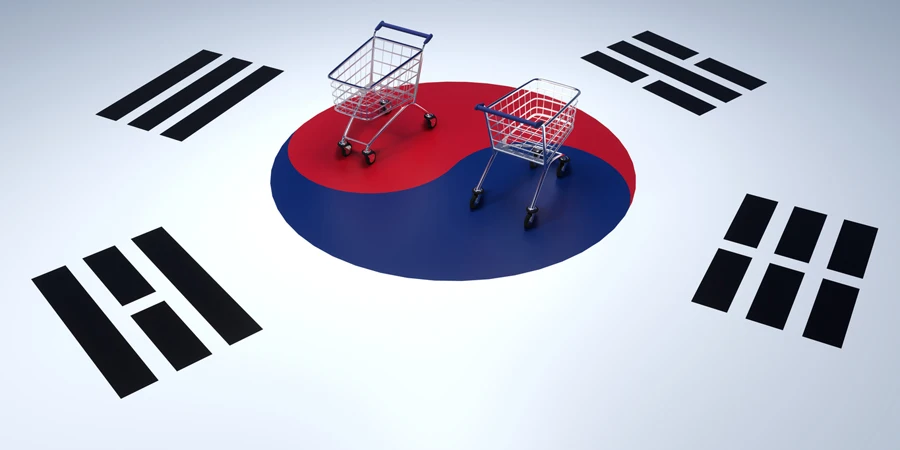The rise of South Korea’s tech innovations and pop culture exports has spotlighted the nation’s consumer products and retail industry.

South Korean culture is prevalent in many areas of modern daily life, whether that’s food, TV, fashion, or music.
This prevalence is known as ‘Hallyu’, or the Korean Wave, and its influence has inevitably caused a global retail boom for Korean products across various segments.
The South Korean retail market size was valued by GlobalData’s retail intelligence at KRW 440.5tn in 2022. The market is expected to grow at a CAGR of more than 5% during 2022-2027.
The nation’s e-commerce market is also forecast to surpass the KRW202.6tn mark in 2027.
This is aided by the nation’s technological advancements, resulting in high-speed internet, rising smartphone penetration, and the availability of secure online payment systems.
Leading the charge are companies such as Samsung Group, LG Electronics, and Hyundai Motor, globally influential names synonymous with advancement, product innovation, and efficiency.
But outside of individual companies (as far-reaching as their influence is) South Korea’s international dominance across a variety of retail segments boils down to a mutually beneficial symbiosis with foreign companies.
South Korea provides both cultural exports that are highly useful for sponsorship and promotion for retailers, and fertile ground for foreign direct investment from all corners of the world.
Global companies ride the Korean Wave
No matter the segment or product offering, companies across the world are investing in South Korea and its consumers.
As a recent example, Swedish furniture retailer IKEA announced plans to invest €300m ($327m) in South Korea up to 2026, with the aim of bolstering its market share in the country.
Physical retail is also proving attractive for foreign investors, as demonstrated by a deal in February between Thai and South Korean department store developers. This included a shopping experience centred around Korean culture including K-pop, K-food and K-fashion, to cater to both Thai customers and foreign tourists interested in South Korea.
But online retail reigns supreme in South Korea as the nation’s citizens are frequent online shoppers. Over 80% of the consumers reported to have shopped online in the past six months, while only 10% indicated that they never shopped online, according to GlobalData’s 2023 Financial Services Consumer Survey.
This has led to further foreign investment from companies such as YouTube, which launched its first official online shopping channel in South Korea in June 2023, live-streaming products from over 30 brands in the Korean language.
YouTube will have difficulty competing with South Korean e-commerce giant Naver, which leads this space by enabling merchants to live stream their products on its “Naver Shopping Live” platform. Customers can view the product details, interact with the seller, and buy from the platform on real-time.
Confidence in South Korean physical and online retail is bolstered by the soft power of its cultural phenomena, which serve as highly effective marketing tools.
South Korean culture and retail collide
Most people have heard about at least one South Korean cultural product, broadly known as ‘K-content’.
This could be a successful K-Pop music group, or a K-Drama TV show, which have flooded streaming platforms in recent years.
These successes have inevitably resulted in major retail profits through merchandise, sponsorships, or intellectual property deals.
One of the most famous K-Pop music groups of all time, BTS, are frequently in advertisements for products ranging from Samsung phones, to Xbox games, to Calvin Klein apparel. The popstars are also Seoul Tourism ambassadors.
Another successful group Blackpink has seen its members appointed as global ambassadors for luxury fashion houses including CELINE, Dior, and Chanel. Through product campaigns, event attendances, and social media posts, South Korean ambassadors are guaranteed marketing money-makers.
In the realm of TV, Netflix’s runaway success Squid Game, released in 2021, led to the show reportedly increasing Netflix’s value by $1bn in two years. South Korea has also been successful in its cinema output, with director Bong Joon-Ho’s film Parasite winning Best Picture at the Oscars in 2020.
As these cultural icons have raised the global profile of South Korea, the nation’s businesses have been able to capitalise on this.
South Korean beauty, known as ‘K-Beauty’ has skyrocketed, and is estimated to be worth over $10bn. Products from national skincare and beauty brands such as Laneige and COSRX are highly sought after by international consumers.
Korean grocers have also benefitted from the revered status given to food items such as Buldak ramen, gochujang, and dishes like bibimbap. Retailers like H Mart and Oseyo have capitalised on this.
Global fascination with South Korea shows no signs of slowing down and continues to produce impressive profits for international and domestic players across a range of retail segments.
Source from Retail Insight Network
Disclaimer: The information set forth above is provided by retail-insight-network.com independently of Chovm.com. Chovm.com makes no representation and warranties as to the quality and reliability of the seller and products.




